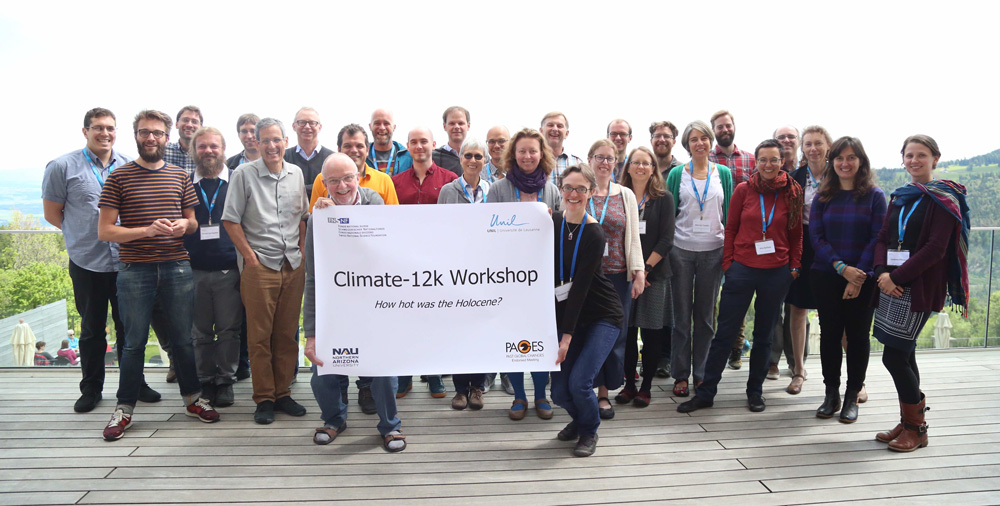 unil.ch
unil.ch
The PAGES-endorsed CLIMATE-12k workshop "How hot was the Holocene?" will be held from 10-13 June 2019 in Sainte-Croix, Switzerland.
Venue
The workshop will take place at the Grand Hôtel des Rasses, near Sainte-Croix in the Jura mountains, Switzerland.
Logistics
This is an open workshop with financial support for approximately 30 participants. Arrival should be on 10 June in the late afternoon/early evening, and departure on 13 June in the afternoon. For more details on the practicalities, and travel connections, go to: http://wp.unil.ch/davisgroup/workshop-practicalities/
Description
Interest in current and future warming has focused attention on climates in the past when the Earth was warmer than present. Evidence suggests that temperatures were higher than today during the early-mid Holocene over higher latitudes of the Northern Hemisphere, but the global picture remains poorly understood. Uncertainties are large because current studies remain based on either sparse global site networks, or denser site networks that are limited to only a few developed regions of the Earth.
The CLIMATE-12k workshop aims to utilize recent improvements in spatial coverage to create a community-based estimate of global temperature change over the last 12,000 years using a much larger network of published marine and terrestrial temperature reconstructions than previously investigated. This new analysis will allow us to better place recent and future projected warming in the context of changes in climate over the last 12,000 years, as well as to investigate an apparent discrepancy between reconstructed and modelled global temperature change during the Holocene known as the 'Holocene temperature conundrum'.
The workshop is designed to provide an important contribution to the next IPCC report, with a synthesis product planned for submission by the WGI deadline of December 2019. The workshop will also establish the foundations for a larger future community effort to document and explore the causes of Holocene climate change at the global scale.
Objectives
The workshop has three specific objectives:
1. To create a new data synthesis of published marine and terrestrial quantitative temperature reconstructions from sites throughout the world over the last 12,000 years.
2. To then use this synthesis to calculate global mean temperature through the Holocene, as well as other seasonal and regional temperature metrics. These results will then form the basis for comparison with transient Holocene climate model simulations.
3. To create the foundations for a new future community effort to document and explore Holocene climate at the global scale, which will also involve other aspects of climate such as precipitation. A key objective will be to establish for the first time a centralized, integrated and fully documented public database of Holocene climate reconstructions.
Outputs
The workshop will deliver the following:
1. A large data product with associated paper describing the source, location, collection and data attributes of the CLIMATE-12k database of site-based temperature reconstructions, and including an discussion of future directions. All data contributors will have the opportunity to join as co-authors of this paper.
2. A public database of regional to global Holocene temperature reconstructions. This will provide a 'one-stop-shop' for reconstructions that are currently only available from different locations, and with incompatible formats and levels of documentation.
3. A high-impact paper describing the temperature evolution of the Earth over the last 12,000 years and the ability of models to simulate this.
Pre-workshop activities
The success of the workshop will depend on pre-workshop activities to identify, gather, process and analyze available published quantitative Holocene temperature records. These activities will be conducted by remote working in small teams described below, with each team contributing to the database by the latest March 2019.
Participation in the workshop is dependent on your participation in these pre-workshop team activities. All teams and team participants will report their findings at the workshop in June 2019.
1. Terrestrial - Pollen
2. Terrestrial - Chironomids
3. Terrestrial - Others, including Ice cores, Isotopes, Macrofossils, TEX
4. Marine - including Alkenones, Mg/Ca, Forams, Chrysophyte Cysts, Diatoms
5. Climate Modeling - transient model simulations
6. Database/Analysis - including design, construction, metadata protocols
Teams will first meet by teleconference in late January, and then again in early March, or as required, with more regular communication by email.
Costs and financial support
The workshop is financially supported by the Swiss National Science Foundation HORNET project. There is no registration fee. Full or partial support is available on application for travel, and meals and accommodation at the workshop.
Registration
Please fill out the online form as soon as possible: https://bit.ly/2BtKTZK.
Applications will start to be considered after 15 December 2018 and will continue until all places are full.
Please note that there are only a limited number of places available for the workshop and that funding is limited. Applications will be prioritized according to relevant expertise and stated motivation, as well as the amount of requested financial support.
Applications from female and early-career scientists are very welcome, as well as those from developing countries. Please note that participation in the workshop also involves a commitment to participate in the pre-workshop activities where necessary. The organizers reserve the right to exclude any participant who does not actively participate in these activities before the main workshop.
Early-career researcher opportunities
A number of places for ECRs have been reserved. Places are fully funded but limited. Please take care to read about the purpose of the workshop, and to describe in your application how your current or past research is relevant to the workshop objectives. To apply you need to fill in the online application form: https://bit.ly/2BtKTZK
Organizing committee
- Dr Basil Davis, Univ. Lausanne, Switzerland (basil.davis@unil.ch)
- Prof. Oliver Heiri, Univ. Basel, Switzerland (oliver.heiri@unibas.ch)
- Prof. Sam Jacqard, Univ. Bern, Switzerland (samuel.jaccard@geo.unibe.ch)
- Prof. Darrell Kaufman, Northern Arizona Univ., USA (darrell.kaufman@nau.edu)
Further information
More details can be found on the workshop website: http://wp.unil.ch/davisgroup/climate-12k/
Or contact Basil Davis directly: basil.davis@unil.ch
Post-meeting material
 |
Workshop participants. Click to enlarge. |